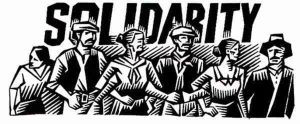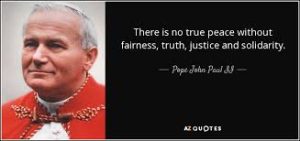
It was Pope John Paul II who described solidarity as a social virtue. Solidarity is defined as unity or agreement of feeling or action, especially among individuals with a common interest. It consists of mutual support within a group.
Solidarity as a social virtue is the strong and unwavering commitment to the common good of all people. We must recognize we are part of the human family and united by shared dignity. It involves an active recognition of our connection and a willingness to support those in need. This virtue encourages a transformation of individual and social perspectives, moving away from self-interest towards mutual service and responsibility for one another’s well-being.
Everyday acts of solidarity include simple kindnesses, comforting a friend, neighbor, or even a stranger, listening empathetically when someone is speaking, donating blood, and shopping at local businesses to support economic stability within our communities. We must emphasize the importance of the good of everyone, not just a select few. We are all responsible for our collective good.
Solidarity must be a conscious and sustained commitment to act for the benefit of all, particularly the poor and vulnerable. It cannot be just a momentary effort. It is accepting our duty and obligation to our neighbor and active steps to promote the well-being of our community. By promoting a communal spirit and a sense of shared responsibility, solidarity helps to foster a more harmonious and just society.
Solidarity can foster empathy, compassion, and a deeper understanding of others’ struggles by encouraging people to listen to and support oppressed groups. It builds cohesive social bonds within a group, which can be a fundamental for a healthy society and a means to build collective power. The benefits of solidarity include improved mental health through increased connection, empathy, and purpose. Standing in solidarity can provide a sense of agency and empowerment, counteracting feelings of helplessness. It can be a form of self-affirmation by standing up for shared values with like-minded people.
The world’s history if full of examples of solidarity movements making a difference -Civil Rights, Anti-Apartheid, and especially the Polish Solidarity Movement in the 1980s. The Polish Solidarity movement was a nonviolent and anti-communist social movement, led by Lech Wałęsa. It began with a series of strikes at the Gdańsk Shipyard, driven by rising food prices and poor working conditions, but it grew into a broad-based social movement, commitment to democracy, united against the authoritarian regime. It ultimately contributed to the dismantling of communist rule in Poland.
America was founded at the high point of the Enlightenment and built on Enlightenment ideas such as social differences being settled through deliberation and democracy – moral reasoning. A free society will work for a more just and equitable world for everyone, regardless of their location or background. A society built on solidarity.
Today our Nation’s moral reasoning has been reduced to “if it feels right, do it.” The moral reasoning void has been filled with “Identity Politics.” People identify with their political group, and they play the victim of oppression while the other side is the oppressor. This now provides a sense of belonging and social recognition. However, identity politics undermines democracy. If our beliefs are defined by our identity, then we are all living in different worlds, and there is no point in trying to engage in purposeful democracy. As a result, we are allowing social solidarity to be imposed from the top down via the power of the state.
The root word for “solidarity” is the Latin word solidus, which means “solid” or “whole.” Sociologist Émile Durkheim noted that complex, diverse societies can form “organic solidarity” through interdependence, even without the similarity found in traditional communities. But only by intentionally creating a shared humanity with practices like open dialogue and empathy.
Christians need to remember our solidarity is the key to our witness. Solidarity is grounded in biblical accounts of creation, emphasizing the inherent dignity and social nature of humanity as a unified family. Solidarity acknowledges all humans are connected, created in the image of God, and share a common destiny, fostering a sense of being in the same boat. Solidarity was crucial to the survival of the early church. The communal support in the face of intense persecution and social hostility sustained existing members and attracted new ones.
Our culture will change if we organize to feed the hungry, clothe the naked, protect the powerless, and provide a sense of dignity to the millions who feel unloved and unwanted. The Lord asks and invites us to reawaken and put into practice the solidarity capable of giving strength, support and meaning to these times when everything seems to be floundering.
“Love your neighbor. Love the stranger. Hear the cry of the otherwise unheard. Liberate the poor from their poverty. Care for the dignity of all. Let those who have more than they need share their blessings with those who have less. Feed the hungry, house the homeless, and heal the sick in body and mind. Fight injustice, whoever it is done by and whoever it is done against. And do these things because, being human, we are bound by a covenant of human solidarity, whatever our color or culture, class or creed.” – Rabbi Lord Jonathan Sacks




